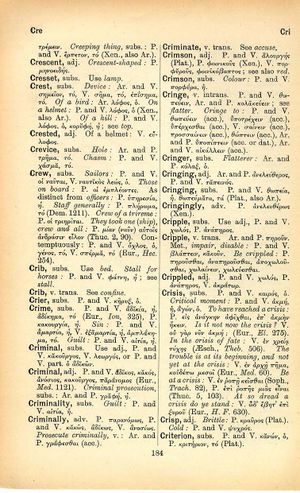crew: Difference between revisions
From LSJ
Dante Alighieri, Paradiso, XXXIII, v. 145
(CSV3) |
m (Text replacement - "<b class="b2">Hec.</b>" to "''Hec.''") |
||
| Line 14: | Line 14: | ||
<b class="b2">They took one</b> (<b class="b2">ship</b>), <b class="b2">crew and all</b>: P. μίαν (ναῦν) αὐτοῖς ἀνδράσιν εἷλον (Thuc. 2, 90). | <b class="b2">They took one</b> (<b class="b2">ship</b>), <b class="b2">crew and all</b>: P. μίαν (ναῦν) αὐτοῖς ἀνδράσιν εἷλον (Thuc. 2, 90). | ||
<b class="b2">Contemptuously</b>: P. and V. [[ὄχλος]], ὁ, [[γένος]], τό, V. [[σπέρμα]], τό (Eur., | <b class="b2">Contemptuously</b>: P. and V. [[ὄχλος]], ὁ, [[γένος]], τό, V. [[σπέρμα]], τό (Eur., ''Hec.'' 254). | ||
}} | }} | ||
Revision as of 11:51, 7 August 2017
English > Greek (Woodhouse)
subs.
Sailors: P. and V. οἱ ναῦται, V. ναυτικὸς λεώς, ὁ.
Those on board: P. οἱ ἐμπλέοντες.
As distinct from officers: P. ὑπηρεσία, ἡ.
Staff generally: P. πλήρωμα, τό (Dem. 1211).
Crew of a trireme: P. οἱ τριηρῖται.
They took one (ship), crew and all: P. μίαν (ναῦν) αὐτοῖς ἀνδράσιν εἷλον (Thuc. 2, 90).
Contemptuously: P. and V. ὄχλος, ὁ, γένος, τό, V. σπέρμα, τό (Eur., Hec. 254).

